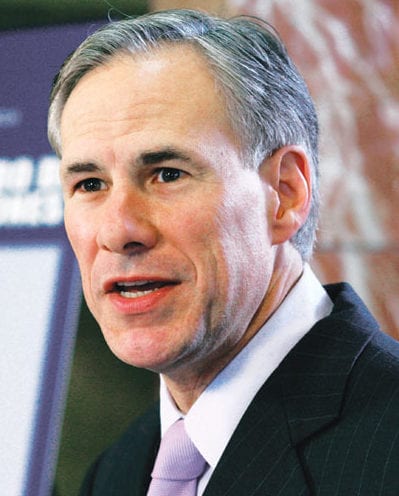 Governor Greg Abbott today signed SB 2065, otherwise known as “the Pastor Protection Act” protecting clergy members from performing marriage ceremonies that violate sincerely held religious beliefs. The bill, by Sen. Craig Estes, R-Wichita Falls and Rep. Scott Sanford, R-McKinney, was filed before an anticipated Supreme Court ruling on marriage equality late this month.
Governor Greg Abbott today signed SB 2065, otherwise known as “the Pastor Protection Act” protecting clergy members from performing marriage ceremonies that violate sincerely held religious beliefs. The bill, by Sen. Craig Estes, R-Wichita Falls and Rep. Scott Sanford, R-McKinney, was filed before an anticipated Supreme Court ruling on marriage equality late this month.
Under the First Amendment clergy members are already protected from performing marriages they may oppose — including same-sex marriages.
Abbott hosted the signing ceremony at the Texas Governor’s Mansion and was joined by members of the legislature who were instrumental in the passage of this legislation, as well as members from the clergy across Texas.
“Freedom of religion is the most sacred of our rights and our freedom to worship is secured by the Constitution,” Abbott said in a statement. “Religious leaders in the State of Texas must be absolutely secure in the knowledge that religious freedom is beyond the reach of government or coercion by the courts. Today I am proud to sign into law SB 2065 — the Pastor Protection Act — to ensure that clergy in Texas cannot be forced to violate their religious beliefs.”
Despite the record-breaking number of bills targeting the LGBT community filed this session, only SB 2065 received a floor vote. Initially Equality Texas and others initially opposed the bill over concerns that clergy members who also serve in government roles could deny marriage licenses to same-sex couples. However they dropped their opposition after Rep. Sanford clarified it only applies only to clergy in that official capacity.
Attorney General Ken Paxton, a Republican, called the law necessary.
“With today’s signing of SB 2065, Texas took a small but important step to further protect the religious freedom of clergy in the face of increasing hostility toward people of faith in all walks of life,” he said in a statement.
But to Paxton and others, the bill is not enough. Recently some social conservative leaders called for a special session to address same-sex marriage. Abbott indicated he would not call any special session.
“We now have much more work to do to ensure that all Texans can practice their faith and, among other things, recognize traditional marriage without being punished, harassed or discriminated against for their beliefs,” Paxton said, taking a swipe at the governor.
“Whatever the U.S. Supreme Court decides, the people of Texas and its leadership must not sit idly by in the face of hostility and harassment at the hands of a small but loud chorus of activists and the few corporate cronies cowed by them who denounce Texans simply for standing in defense of traditional marriage,” he added.
If not a special session on marriage, then perhaps Paxton is instead mulling another avenue: the 2018 GOP primary.
Abbott signs Pastor Protection Act, reasserting rights that have been reasserted

